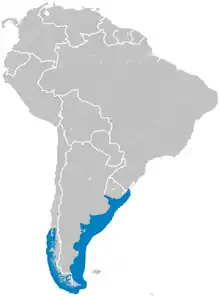| Southern hagfish | |
|---|---|
 | |
| Scientific classification | |
| Domain: | Eukaryota |
| Kingdom: | Animalia |
| Phylum: | Chordata |
| Infraphylum: | Agnatha |
| Class: | Myxini |
| Order: | Myxiniformes |
| Family: | Myxinidae |
| Genus: | Myxine |
| Species: | M. australis |
| Binomial name | |
| Myxine australis Jenyns, 1842 | |
 | |
| Southern hagfish range.[2] | |
| Synonyms[3][4] | |
| |
The southern hagfish (Myxine australis) is a hagfish of the genus Myxine.
Description
It is a harmless scaleless, eel-like animal with a pinkish body, a whitish head and a whitish mid dorsal stripe. The size of captured specimens ranges between 91 and 394 mm.
The southern hagfish is found in the cold waters of the Southwestern Atlantic Ocean from the coasts off Southwestern Brazil down to the Southern Ocean and the Tierra del Fuego and the Patagonian coasts of Chile and Argentina, including the Strait of Magellan. [5]
It lives hidden in the mud in relatively shallow water, between 10 and 100 metres. Its life cycle is unknown.[6]
Hagfish have eyes embedded in their head with clear spots. They feed on dead fish on the bottom of the ocean floors, low temperatures, and high pressures.[7]
References
- ↑ Mincarone, M.M. (2011). "Myxine australis". IUCN Red List of Threatened Species. 2011: e.T196050A8998314. doi:10.2305/IUCN.UK.2011-1.RLTS.T196050A8998314.en. Retrieved 18 November 2021.
- ↑ International Union for Conservation of Nature 2013. Myxine australis. In: IUCN 2015. The IUCN Red List of Threatened Species. Version 2015.2. http://www.iucnredlist.org. Downloaded on 22 July 2015.
- ↑ Froese, R.; Pauly, D. (2017). "Myxinidae". FishBase version (02/2017). Retrieved 18 May 2017.
- ↑ Van Der Laan, Richard; Eschmeyer, William N.; Fricke, Ronald (11 November 2014). "Family-group names of Recent fishes". Zootaxa. 3882 (1): 1–230. doi:10.11646/zootaxa.3882.1.1. PMID 25543675.
- ↑ First record of the Southern hagfish Myxine australis in Brazilian waters
- ↑ Fishbase Myxine australis
- ↑ Fernholm, Bo (1998). "Hagfish Systematics". The Biology of Hagfishes. pp. 33–44. doi:10.1007/978-94-011-5834-3_3. ISBN 978-94-010-6465-1.
